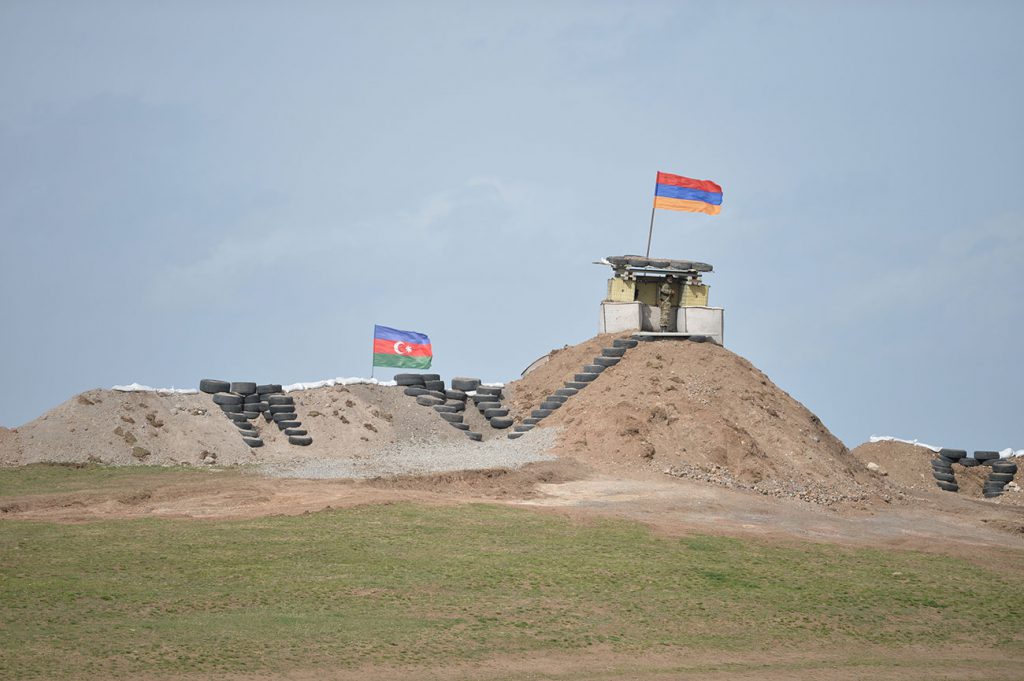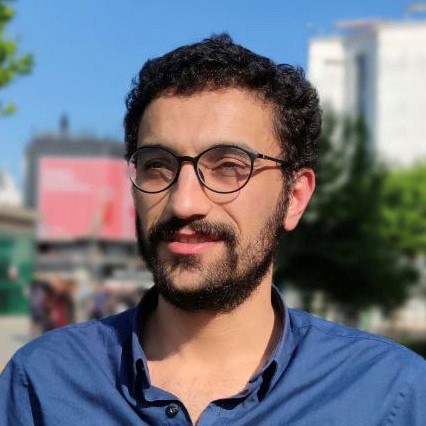With violence between Armenia and Azerbaijan spiking, a debate has emerged among Azerbaijani experts on the causes of the recent escalation, who benefits, and what happens next.
Tensions between Armenia and Azerbaijan have recently escalated to their highest point since the signing of the agreement that brought an end to the Second Nagorno-Karabakh War on 10 November.
Dozens of clashes, mostly between Armenian and Azerbaijani forces near the Armenia-Azerbaijan border and the Nagorno-Karabakh line of contact, have left at least half a dozen soldiers dead since May. Tensions have also risen on the diplomatic side, with Azerbaijani President Ilham Aliyev regularly referring to territory inside the Republic of Armenia with Azerbaijani names and vowing that ‘we will return’.
Armenia, meanwhile, has bristled at Aliyev’s comments and has begun new weapons purchases from Russia — symbolised on 11 August by the ceremonial gift of a dagger from Russian Defence Minister Sergei Shoigu to Armenian Defense Minister Arshak Karapetyan.
Among Azerbaijan’s independent experts there have been a multitude of perspectives on the causes of the ongoing tensions — though there appears to be a consensus that the present tension is a very dangerous one.
Russia and Armenia
Arzu Abdullayeva, Head of Azerbaijan Office of Helsinki Citizens Assembly, told OC Media that she believes Russia to be behind the recent tensions. ‘All the clashes that have taken place in recent days are in fact Russian provocations, because Russia’s interests are always at the forefront, as always’, she said, adding that ‘war is not expected’.
According to Abdullayeva, Azerbaijan’s main interest post-war remains the ‘opening of the corridor mentioned in the tripartite peace agreement’. The corridor is of key geopolitical importance, she said, as it will provide Turkey direct access, via Azerbaijan, to central Asia.
For any positive development to be possible, Azerbaijan must tone down the heat, as it cannot ‘achieve any results with harsh rhetoric’ and should ‘offer real diplomatic rhetoric and solutions’.
Meanwhile, Pashinyan remains ‘the best political figure for Armenia in the current situation’ as he ‘is the person who knows the best way out of this crisis’.
Ahmad Alili, the director of the Caucasus Center for Political Analysis, a Baku-based independent think tank, told OC Media that he thinks that the priority for Baku is the delimitation and demarcation of borders. In particular, he said, Baku has an interest in seven Azerbaijani exclave villages under Armenian control.
Control over this territory, located in northeastern Armenia and which overlaps with the main thoroughfare connecting Armenia to Georgia, would allow for ‘the safer operation of gas and oil pipelines from Azerbaijan to Georgia’. Additionally, it would allow Baku to ‘control all communication lines from Yerevan to Tbilisi’.
But Armenia, he said, is unlikely to sign any document that demarcates and delimits borders. If such a document is signed, ‘it will be a recognition of the territorial integrity of Azerbaijan, that is, Nagorno-Karabakh will be accepted as an integral part of Azerbaijan’.
As a result, Alili argued, Armenia is ‘trying to postpone’ negotiations or the signing of any documents.
‘Decent and dignified’
‘Although Azerbaijani President Ilham Aliyev declared [the Nagorno-Karabakh conflict] is solved, the facts on the ground contradict these statements’, Eldar Mammedov, foreign policy advisor to the Socialists and Democrats Group in the European parliament told OC Media. Mammedov underlined that his comments were ‘made in a private capacity and do necessarily reflect the position of the European Parliament’.
‘You can declare that this question is closed and that there is no such a thing as “Nagorno-Karabakh”, but only “Karabakh”’, he said. ‘But this assessment neither reflects the realities nor is it shared by major powers like the U.S., Russia, France and the European Union (EU)’.
Mammedov also pointed out that part of Nagorno-Karabakh is presently under the protection of Russian peacekeepers and that Azerbaijan’s sovereignty over the territory has not been fully re-established.
‘These forces are there because the rhetoric and actions of the government in Baku do not reassure the local Armenians about their future as part of Azerbaijan’,
Baku ‘can try to impose its will by force’ he said, but that would ‘pit it against the West and Russia’. It would also have to be prepared to ‘ethnically cleanse the whole Armenian population’ from the territory — an action with a very ‘high cost’ to Azerbaijan’s international reputation.
The best Azerbaijan can do, Mammedov argued, ‘is to offer a decent and dignified deal to the Karabakh Armenians to convince them that they have a future in Azerbaijan’.
‘Mutually acceptable solution’
When it comes to the ‘unblocking the trade and transport communications in the region’ as spelled out in the tripartite peace declaration, Mammedov agreed that Baku has a particular focus on what he said it ‘interpreted’ as the ‘Zangezur corridor’.
The stress on the ‘corridor’ Mammedov said, is misleading.
‘The trilateral statement of 9 November 2020 says nothing specific about this “corridor”’, Mammedov said. ‘Only about the general principle of establishing direct communication between the western regions of Azerbaijan and Nakhichevan’.
Establishing such a direct line of communication, according to him could ‘in principle, foster economic interdependence and shared prosperity in the region’ but that this possibility is ‘consistently undermined by Baku’s talk of Zangezur as “historically Azerbaijani land” as it ‘fuels fears on the Armenian side’ that establishing this link would be a cover for the annexation of southern Armenia.
‘Any viable long-term solution requires a buy-in from all parties concerned, including Armenia’, Mammedov said. ‘Azerbaijan should not repeat the miscalculation made by Armenia in the early 1990’s that it could keep its military gains forever, without finding a mutually acceptable solution.’
Who benefits?
According to Mammedov the ‘main beneficiary’ of the ongoing tensions is the Azerbaijani president and that they are his way of expressing that some ‘key provisions’ of the trilateral agreement, ‘such as the re-opening of the trade and transport communications’ have not yet been implemented.
‘It is designed to put pressure on Armenia to deliver on the opening of the “Zangezur corridor”, and also on Russia as the sponsor of the trilateral statement’, Mammedov said. ‘It is, therefore, no coincidence that the latest round of tensions on the Armenian–Azerbaijani border occurred just before Aliyev’s visit to Moscow.’
Additionally, the tension allows Aliyev to keep Azerbaijani society ‘maintain a mobilisation’ around the conflict and divert attention from social and economic problems in a ‘post-oil era’.
But Aliyev is likely not the only beneficiary of the tensions. They might also benefit Armenian Prime Minister Nikol Pashinyan who is using them to ‘portray Azerbaijan as the “unreasonable party” and try to build international support around this assertion’.
‘This explains Pasniyan’s latest manoeuvring in securing the support of the West – the U.S. and the EU, mainly through the French’, he said.
The danger now is that ‘in the absence of a meaningful political track’ there is the possibility the conflict will escalate ‘unless international players impose a political process’.




 23 August 2021
23 August 2021




